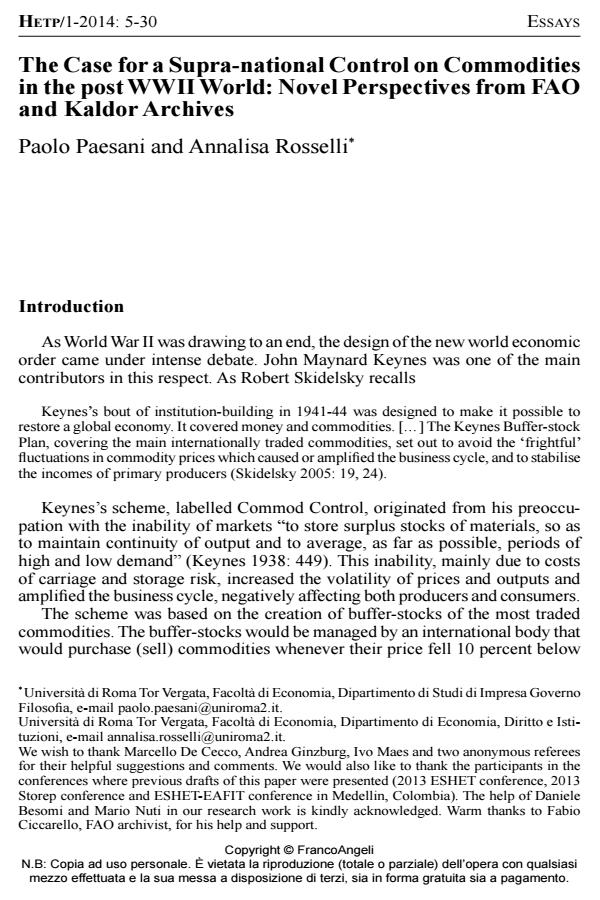The Case for a Supra-national Control on Commodities in the post WWII World: Novel Perspectives from FAO and Kaldor Archives
Journal title HISTORY OF ECONOMIC THOUGHT AND POLICY
Author/s Paolo Paesani, Annalisa Rosselli
Publishing Year 2014 Issue 2014/1
Language English Pages 26 P. 5-30 File size 852 KB
DOI 10.3280/SPE2014-001001
DOI is like a bar code for intellectual property: to have more infomation
click here
Below, you can see the article first page
If you want to buy this article in PDF format, you can do it, following the instructions to buy download credits

FrancoAngeli is member of Publishers International Linking Association, Inc (PILA), a not-for-profit association which run the CrossRef service enabling links to and from online scholarly content.
Commodity markets are characterized by high price volatility, inefficient resource allocation and the cyclical reappearance of excessive surpluses and shortages. Historically, these problems and their relevant socio-economic implications have been tackled by means of protectionist measures at the national level, with cartels among producers or, in some rare cases, with international agreements among producers and consumers of a single commodity. At the end of World War II, however, a number of ambitious projects were put forth by multilateral organizations and by individual economists. These projects (e.g. World Food Board, International Commodity Clearing House, International Commodity Reserve Currency) aimed at overcoming traditional commodity problems by means of supra-national institutions and the coordinated management of all the main commodities within a unified scheme capable of combining stable prices and abundant supplies. The goal of this paper is to reconstruct some of these proposals, their theoretical underpinnings and the debate they roused. In particular, we intend to focus on the role played by the Food and Agriculture Organisation and by the experts who were involved in its projects. While individual contributions by some economists belonging to this group of experts have been widely investigated in the literature, their reciprocal influences and the relevant intellectual and historical context have received much less attention. Recent important publications bearing on this question and the re-opening of FAO archives add new angles on and insights into this issue.
Keywords: Keynes, Food Agriculture Organization, Stabilization of commodity prices, Buffer-stock
Jel codes: B22, F02, N50, Q02
- How speculation became respectable: early theories on financial and commodity markets Paolo Paesani, Annalisa Rosselli, in The European Journal of the History of Economic Thought /2021 pp.273
DOI: 10.1080/09672567.2020.1817117 - “The most important research project”: the World Bank and the commodity problem of international development in the 1960s Mirek Tobiáš Hošman, in The European Journal of the History of Economic Thought /2024 pp.1034
DOI: 10.1080/09672567.2024.2433949 - RICHARD KAHN AND THE STABILIZATION OF COMMODITY PRICES Annalisa Rosselli, in Journal of the History of Economic Thought /2017 pp.483
DOI: 10.1017/S1053837217000499 - Richard F. Kahn Maria Cristina Marcuzzo, Paolo Paesani, pp.1 (ISBN:978-3-030-98587-5)
Paolo Paesani, Annalisa Rosselli, The Case for a Supra-national Control on Commodities in the post WWII World: Novel Perspectives from FAO and Kaldor Archives in "HISTORY OF ECONOMIC THOUGHT AND POLICY" 1/2014, pp 5-30, DOI: 10.3280/SPE2014-001001